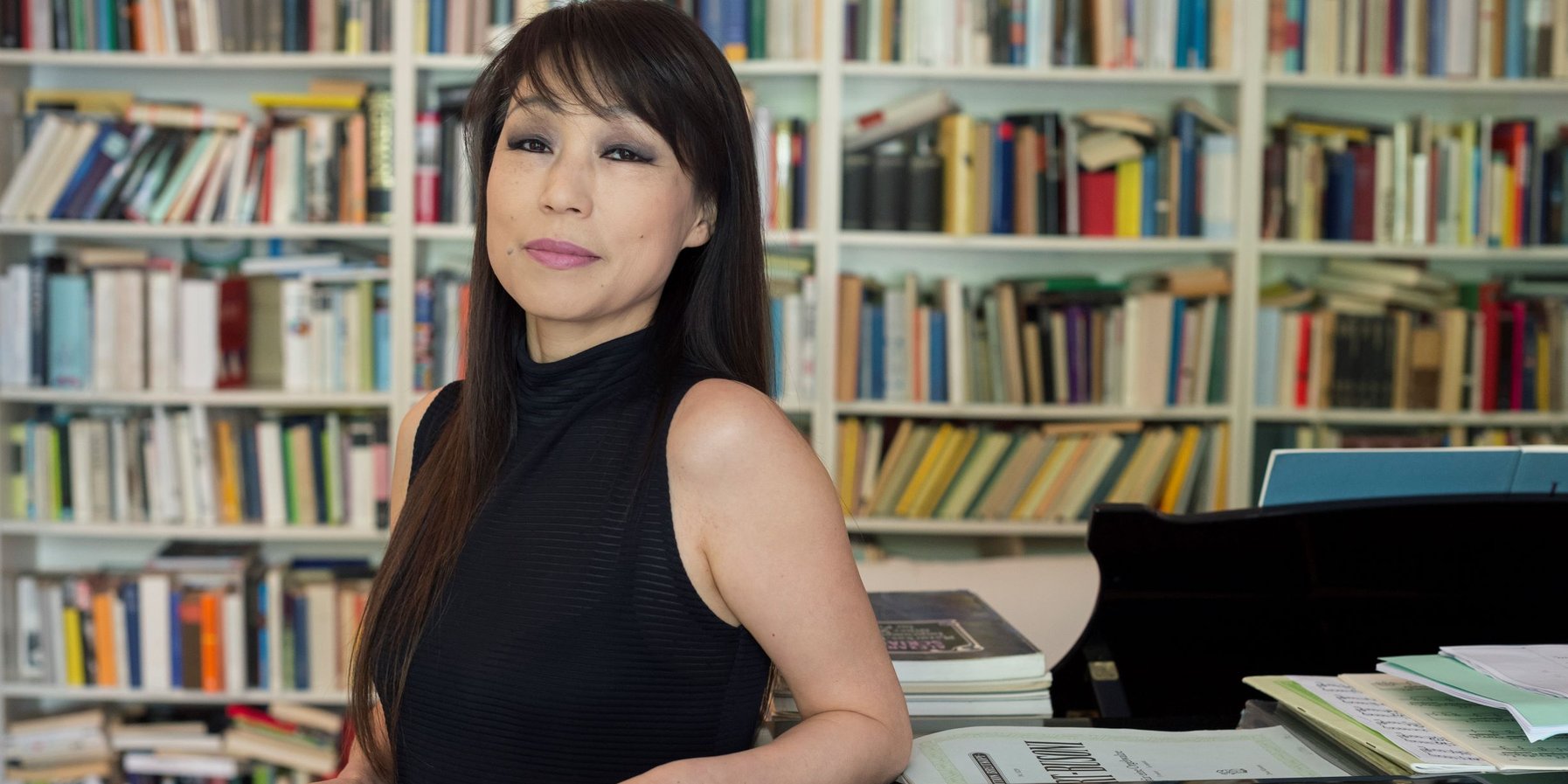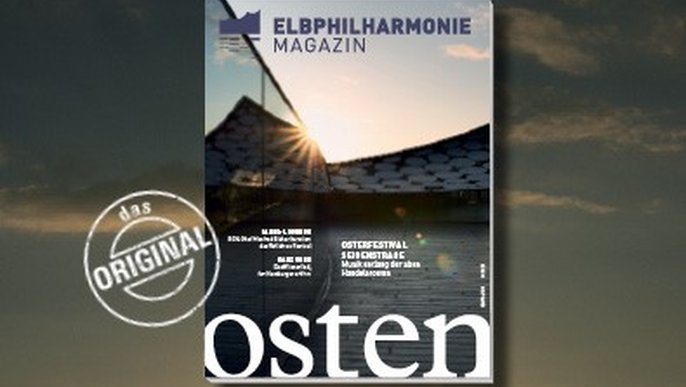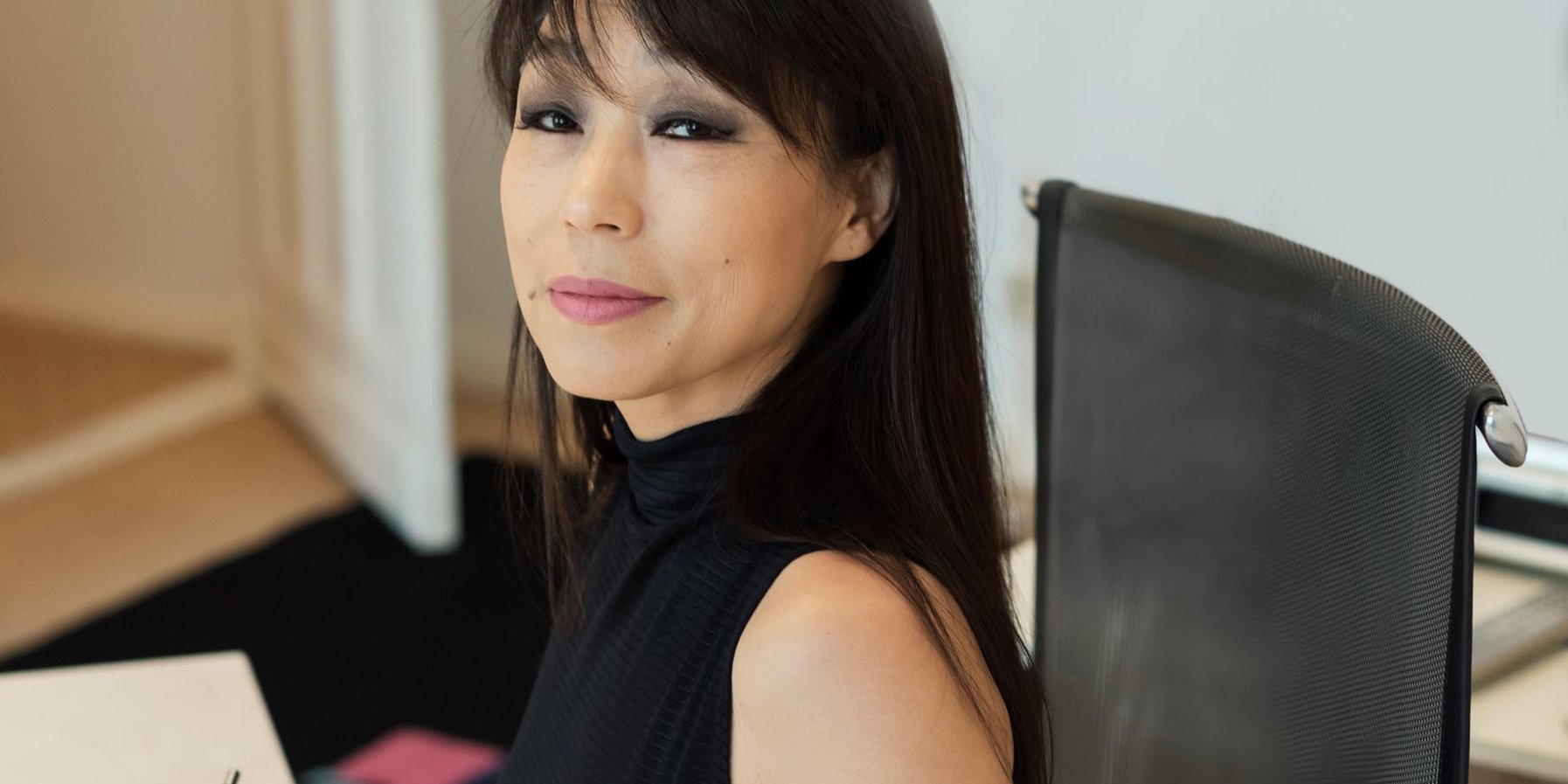Unsuk Chin’s art radiates a shimmering, a flickering and glittering. Fragments of sound congregate like shoals of fish to form vibrant forms, then they scatter and vanish before the mind has had a chance to grasp them. The composer uses the orchestra like a big construction kit: she conjures up tiny details, twirling and tweaking them into shape, and piles up layer upon layer of timbres, sounds and rhythms so accurately that the listener finds himself confronted with only an iridescent whole. With concentrated, teeming sensuousness, eerily beautiful. As critic Wolfram Goertz puts it: »If you suffer from New Music phobia, Unsuk Chin will cure you.«
»My music reflects my dreams.«
Unsuk Chin
Notes with black stripes
The South Korean composer has a hypersensitive instinct for sounds and colours, for the world of sensuous experience per se. »As a child I had visions of intense light and incredible blazes of colour, visions where the laws of physics and logic seemed to be turned upside down. I saw every note in an individual colour, yellow or with black stripes«, she says. Neurologists call this ability synaesthesia. The people who have it hear colours, they smell numbers or feel sounds physically. Unsuk Chin puts down what she feels on paper. »My music«, she says today, »reflects my dreams. Dreams are graphic just like my pictures of timbres and musical shapes.«

The Stigma of a Loser
»If you suffer from New Music phobia, Unsuk Chin will cure you.«
Wolfram Goertz
If one had asked the composer 40 years ago, she would probably have given a different answer. Unsuk Chin grew up in South Korea, one of the world’s poorest countries in those days. Shattered by the war that the divided country had conducted in the 1950s, Korea tumbled into military dictatorship. As a child, Chin dreamed of a career as a professional pianist. But in practice, she just about managed to improve the tight family finances with occasional recitals. There was no money to pay for lessons. »It was a struggle to survive. Looking back now, it reminds me of the Cinderella story: doing the laundry, lighting a fire, fetching water in a can. Music was often my only salvation: without it I would have been utterly desperate.«
Instead of playing the piano, Unsuk Chin explored the world of classical music as a listener. Surrounded by records in her school’s music room, she inhaled the sounds of a distant world till late at night: Tchaikovsky, Beethoven, Mozart, Stravinsky. The entirely self-taught young woman ended up applying to study composition at the University of Seoul, but she wasn’t familiar with the admissions procedure, and her application was rejected twice. She felt stigmatised as a loser and started drinking and taking tranquillisers. But she applied a third time – and was accepted.
Unsuk Chin: Mannequin
»as if she was in a fairy tale«
From that point, things began to look up. She read contemporary scores from Europe, where the modern movement was taking the music world by storm and rebels like Karlheinz Stockhausen and Pierre Boulez were sweeping away the bombast of the old century with sequences of notes based on mathematic principles. Unsuk Chin started composing in this serialist style herself – and quite unexpectedly, one of her pieces was performed at the World New Music Days in Toronto. She felt »as if she was in a fairy tale« when her next work, »Spektra«, won the prestigious European Gaudeamus Competition. And that same year, 1985, she was awarded a scholarship to continue her studies in Hamburg.
Her Fiercest Critic
On the face of it, it looked as if things had finally started to happen: people were talking about Unsuk Chin, and she received commissions and offers from publishers. But inwardly, she began to have doubts about her sudden success: strict serialism didn’t feel like her own musical identity. One person who fuelled her uncertainty was her new composition teacher, György Ligeti. His working methods were scrupulous and he demanded originality at all costs from his students. Ligeti was thoroughly allergic to any dogma such as those disseminated by the postwar avant-garde. »You’re a brilliant composer«, he told his new student, »but your music is a copy. You might as well throw it all away. You need to find yourself.« Successful newcomer Unsuk Chin turned her back on the rules and formulas she had learned and fell into a deep hole: she was unable to compose anything for almost three years.
Hidden in Berlin
»And that, too, is a feature of Chin’s art: every excursion into the realm of pathos, every feeling once reached crumbles without further ado.«
Only once she freed herself from Ligeti’s influence by moving to Berlin did she manage to relax again. No-one in Berlin knew the 27-year-old composer, and in this period, Chin says, she lived almost as a recluse, working quietly on her own. This helped. She pursued pure research in the electronic studio of Berlin’s Technical University: with the help of a computer, she broke down, filletted and analysed sounds, the raw material that every composer works with. Years later, these experiments were still yielding works like »Xi«, in which tiny components are concentrated to form sounds.
But first and foremost, her experiments with electronic music gave her a new freedom to compose using material beyond the realm of classical intervals and sequences of notes: she replaced these with the overtone spectrum of a note, with timbres or sound particles. Starting out with tiny germ cells, superimposed on and interacting with one another, the composer evolved her own voice in the anonymity of the Berlin studio: the grand gestures that make her music seem so vivid and theatrical. Instead of a fixed set of rules, she now followed her own sensory imagination. And there it was at last: something unmistakeably her own, the soul of her music that Unsuk Chin had been looking for years, that identity that Ligeti had mercilessly called on her to find.
Volatile art
This is reflected, for example, in the song cycle »Akrostichon-Wortspiel«, which brought Unsuk Chin her international breakthrough in 1991. Fairy-tale scenes written by Michael Ende and Lewis Carroll are broken down into a mishmash of syllables and sounds so that the emotional content is conveyed first and foremost through gestures and the sounds of language. And she goes down the same path in the Double Concerto for Piano, Percussion & Ensemble, where she throws a wild variety of sounds and structures into the centrifuge – spheric gongs, the clicking and clacking of a prepared piano, cobwebs of floating glissandi, glowing reflections of sound, all of which vanish again before the listener has the chance to get comfortable. And that, too, is a feature of Chin’s art: every excursion into the realm of pathos, every feeling once reached crumbles without further ado in quickfire changes of instrument and games of deception. No emotion is ever savoured to the full: the music keeps its distance.

Extreme situations
»No-one in earth can sing this work.«
Simon Rattle
The performers often find themselves facing hair-raising challenges: Simon Rattle is said to have texted the composer that »No-one in earth can sing this work« after he had looked at the score of »Le silence des sirènes«. In this work, the soprano has to sing extremely high notes, and hardly has a chance to breathe. Unsuk Chin deliberately creates such extreme situations: she wants to challenge people with her music. After all, her own history has shown her that this is the way to achieve great things.
Something Korean
While it wasn’t long before Chin’s works were being performed in other countries in the 1990s, she remained little-known in Germany for more than a decade. She felt out of place in the New Music centres Donaueschingen and Darmstadt as a deserter of the avant-garde, and as a Korean composer all the moreso. »People really expected me to compose something in the supposed Korean tradition. But I grew up with European music, and scarcely knew anything typically Korean.« There are only a few passages in her music that sound at all Korean, such as in »Gougalōn«, where she makes use of childhood memories of a street theatre in Seoul.
Unsuk Chin: Gougalōn
Extract from the score of »Gougalōn« © Boosey & Hawkes. By courtesy of Boosey & Hawkes Bote & Bock, Berlin.
the tables have turned
In the meantime, the tables have turned. In the last twenty years, Unsuk Chin has been performed at major concert venues in Germany, and she has been awarded composition commissions, residences and prizes. And in the 2019/2020 season, the NDR Elbphilharmonie Orchestra devoted an extensive spotlight to the composer, performing many of her important pieces in Hamburg. These works show Chin as the artist that she is: a cosmopolitan with a penchant for surreal stories, paradoxes and comedies of errors, indeed for all things theatrical – something she has in common with her Hamburg teacher György Ligeti.
»It’s important to me that every listener learns something. I don’t want the audience to be indifferent to my music.«
Unsuk Chin
Alice in Wonderland
Her only opera to date, voted premiere of the year in 2007 by the magazine »Opernwelt«, is based on »Alice in Wonderland«, while the piece »Cantatrix Sopranica« makes fun of the habits, vanities and quirks of professional singers by reciting nonsense in the Dada style. »Mannequin« renders E.T.A. Hoffmann’s nightmare novella »Der Sandmann« in music that, like its main character, descends into madness. In all these pieces, wit and truth, intellectual playfulness and sensuousness rub shoulders. »It’s important to me«, says Unsuk Chin, »that every listener learns something. I don’t want the audience to be indifferent to my music.«
Author: Laura Etspüler, last modified on Fri 13 Mar 2020








